'We were left at a loss without our loved ones'
Relatives of victims of the Dublin and Monaghan bombings have described the hurt and pain they continue to live with 50 years on.
Commemorations were held in the Irish capital earlier, with events to follow in Monghan later on Friday.
Catherine Doyle and Sandra O'Brien were among the relatives of those killed who attended the events in Dublin.
Ms Doyle's sister Anna and Ms O'Brien's brother John were a married couple.
They were killed along with their children, five-month-old Anne-Marie and 17-month-old Jacqueline.
"Today is very important. Every year is important, it’s not just the 50th year. I was only nine, she [Catherine] was only six and we’re still sitting here doing the same thing," Ms O'Brien said
"It has been very hurtful to this day."
Ms Doyle said the bombings had been forgotten, but that they had a big impact on how she raised her own children.
"We were left at a loss without them," she said.
"My kids were growing up and I had to stop them from coming into town because I was afraid it would happen to them.
Four car bombings – three of them in the Irish capital – resulted in the highest death toll of any day of the Troubles.
No-one has ever been prosecuted.
Loyalist paramilitary group the Ulster Volunteer Force (UVF) admitted carrying out the attacks 19 years later.
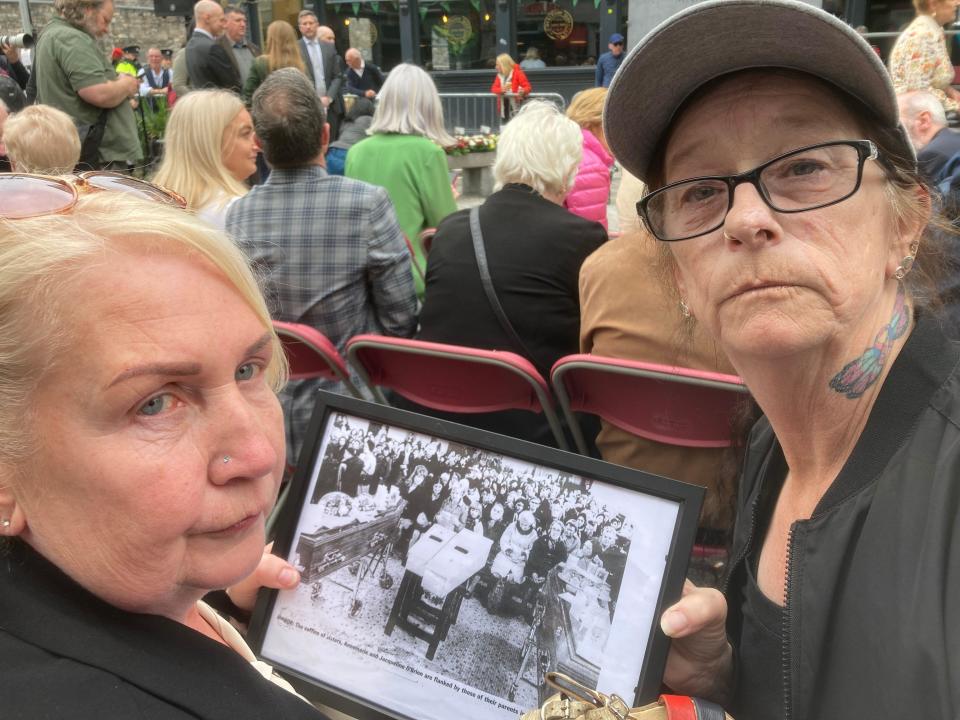
What's happening in Dublin and Monaghan?
Irish president Michael D Higgins, Taoiseach (Irish Prime Minister) Simon Harris and Tánaiste (Irish Deputy Prime Minister) Micheál Martin attended a wreath laying-ceremony at the memorial to the victims in Dublin.
The commemoration event will take place in Monaghan at 18:45.
Speaking to families gathered in Dublin, President Higgins said they had to "bear the grief of those tragic events and, added to it, have had to bear the long wait for information".
Earlier, relatives and survivors attended an anniversary mass at the nearby St Mary’s Pro-Cathedral, celebrated by the Archbishop of Dublin Dermot Farrell.
'I was blessed to survive'
Ahead of the events, survivor Bernie McNally described how she felt like her skeleton rattled when the bomb in Dublin went off.
“I thought I was hit by lightning,” she said, recalling the moment the blast swept her off her feet and blew up the shoe shop she worked in.
In the silence that followed, the groan she heard was a customer buried under the debris.
Ms McNally, who was 16 at the time, recalls temporarily losing her sight before vision returned in one eye, revealing a scene of devastation on Dublin’s Talbot Street.
“The shops that were in front of you one minute, full of lovely clothes and things, were now like a building site," she recalled.
“There were bodies scattered here and there, people dead or dying."
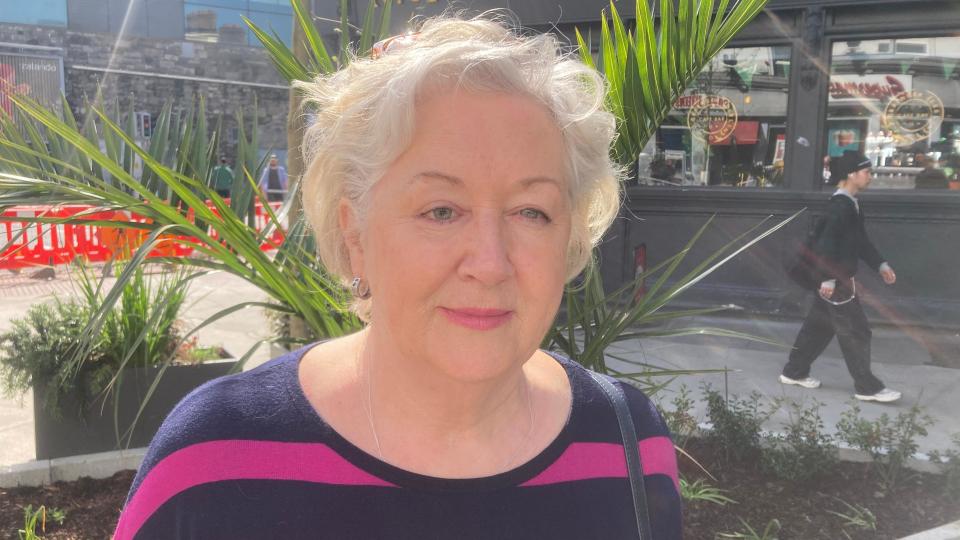
“I saw a fireman taking what I thought was a mannequin out of a window, but it was obviously a body," she added.
“I was blessed to survive and went on to get married and had four children.
“So many people didn’t get a chance to say a last goodbye, or say a prayer.
“They were just instantly killed in the most horrific manner.”
The three Dublin city centre bombs exploded within the space of two minutes at about 17:30 local time on Friday 17 May 1974.
About 90 minutes later, the final bomb went off about 130km (80 miles) north in Monaghan.
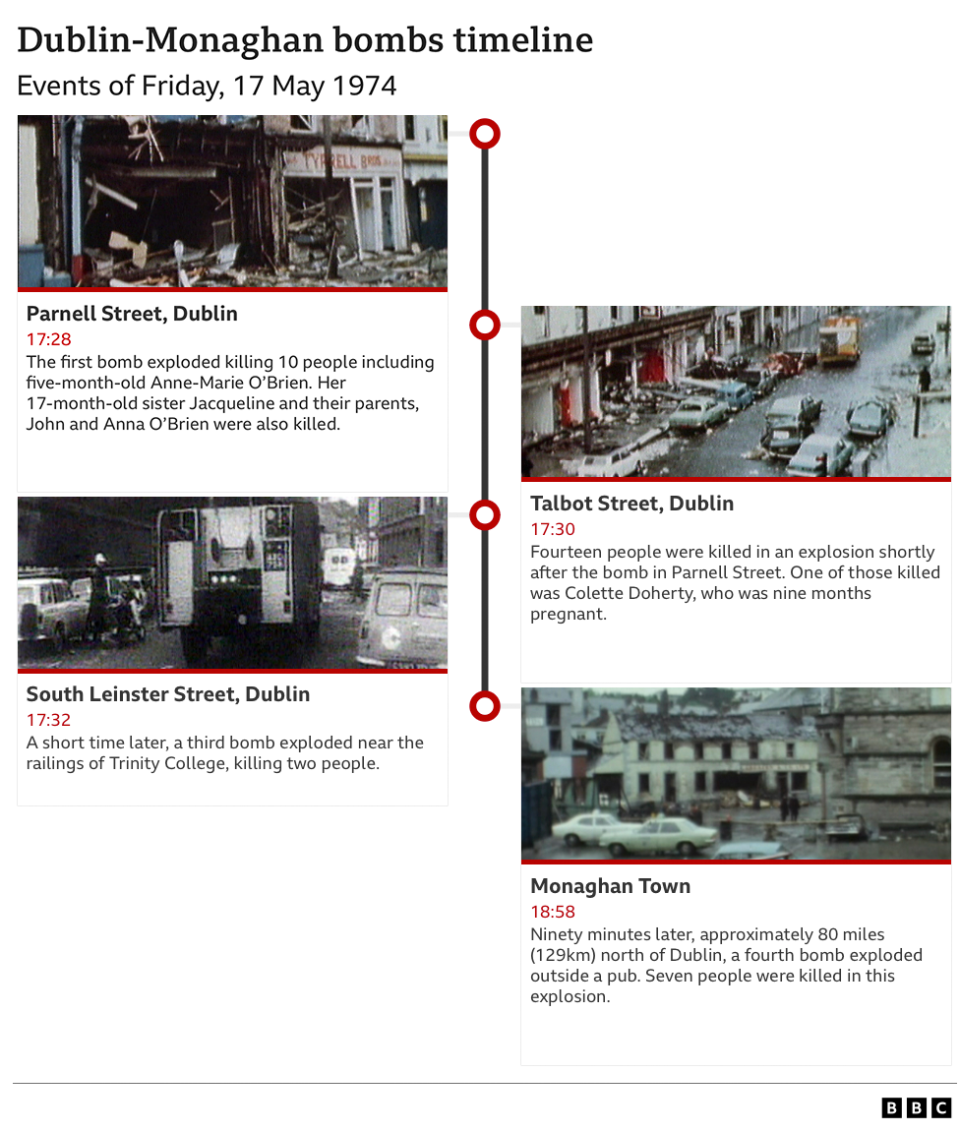
There were no warnings given.
The car bombs were widely seen as having been a reaction to a power-sharing deal which proposed a role for Dublin in running Northern Ireland.
An inquiry led by Mr Justice Henry Barron in the Republic of Ireland in 2003 did not rule out the involvement of members of the British security forces.
It was also critical of the short-lived police investigation.
The Irish government of the day showed little interest in the bombings, it added.
'Difficult to live with'
A campaign group, Justice for the Forgotten, wants the full facts behind the bombings made known.
One of its members, Aidan Shields, lost his mother Maureen.
Pointing at the memorial plinth on Talbot Street, he said: “There are people passing here and I guarantee 99 out of 100 would not know anything about the bombings.
“That is only because it has been brushed under the carpet for the last 50 years.
“It is very difficult to live with that.”
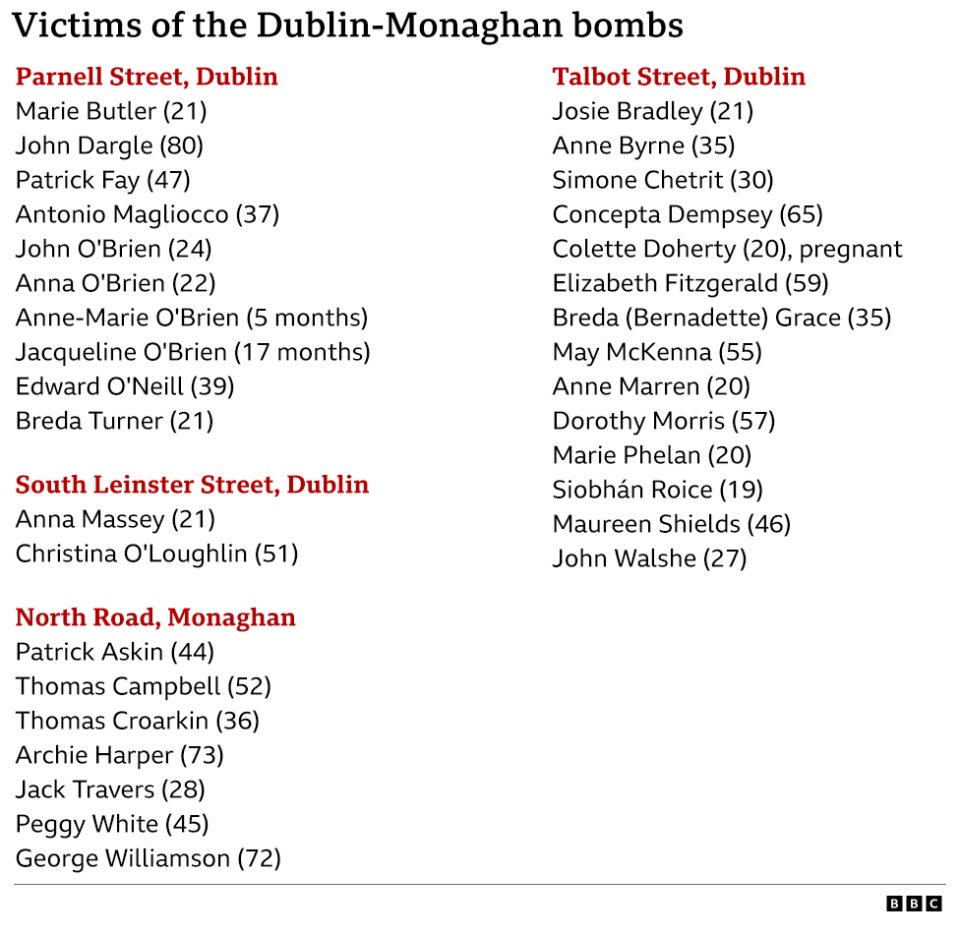
Among the Monaghan bomb victims was Patrick Askin from Glaslough, who had four young children including a set of two-year-old twin girls.
The 44-year-old sawmill employee had stopped for a pint on his way home from work that Friday evening when the device exploded in Church Square.
"Mum was in the kitchen and she heard the bomb going off, so that's six miles away from Monaghan," said the couple's daughter, Sharon Askin.
Her grieving mother had to take on the role of two parents while bringing up her young family alone.
Ms Askin added that her older brothers had fond recollections of their father but neither she nor her twin sister had any memory of him at all.
"It's hard because you don't remember him. People say: 'You never miss what you never had', but you truly do," she said.
"Especially on big days, when the grandchildren were born. He never got to meet his grandchildren."
She said her family still had many questions about the bombing, including why the Garda (Irish police) investigation lasted only weeks.
"They sent the evidence to Ulster to be tested - you may as well hand the sheep to the wolf there,” she added.
'It reminded me of the loss in Ukraine'
In Monaghan, Sofia Makiyiva laid a floral tribute at the memorial.
She is from Donetsk in Ukraine and moved to Monaghan in July.
"I heard about this special day and it reminded me of the loss that is happening in Ukraine," she said.
"It's important to remember the loss and impact on ordinary people's lives. Bad things change the world, but we need to reflect to ensure there's a change in the future.
"I love Monaghan it's an amazing place, I love the people here. I wanted to show my support at this difficult time of remembrance."
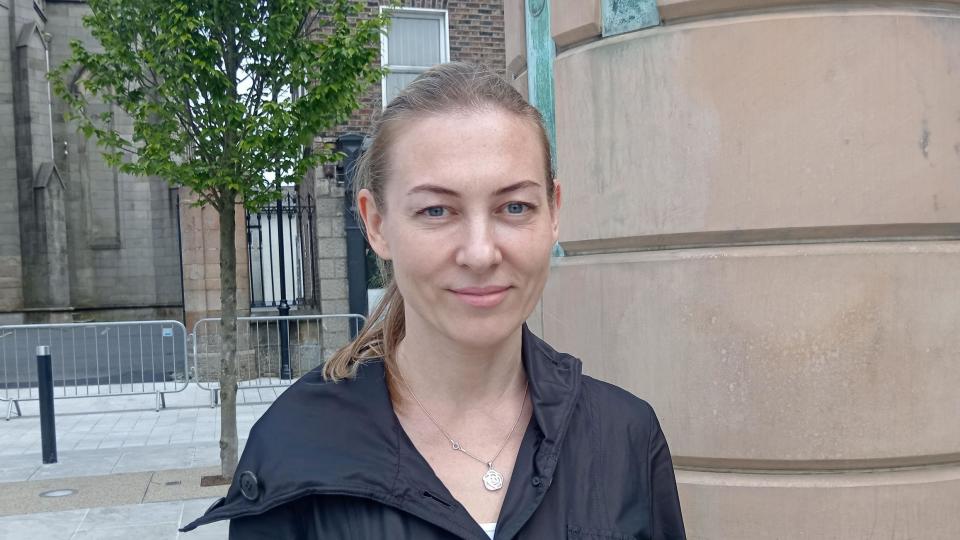
Material never seen before
Two current investigations in Northern Ireland could unearth new information.
Both cover the activities of the UVF in the 1970s.
Operation Denton, under former Police Scotland chief constable Sir Iain Livingstone, has had access to material which has never been seen by any previous investigation.
It was gathered in Northern Ireland and the Republic of Ireland.
Operation Denton will report in 2025.
Sir Iain said: “I firmly believe we have seen far more than any other review or investigation.
“I think we will we be able to explain to families who we think was involved and how agencies of the state, both in Northern Ireland and the Republic of Ireland, responded at the time.
“That is what families of victims deserve.”
A Police Ombudsman investigation, known as Operation Newham, also covers the Dublin and Monaghan bombings.
It will also report within a year.
Many of the bereaved families and survivors have been engaged in long-running legal action against the British government, alleging there was collusion in the bombings.
In April, a court dismissed its attempt to overturn a ruling to hand over documents.
“The recent court success couldn’t be any more timely, coming as it does within a few weeks of the 50th anniversary,” said solicitor Kevin Winters, who is acting for families.
“It means we can now revisit the discovery order and we can now proceed to a long overdue full hearing.”


